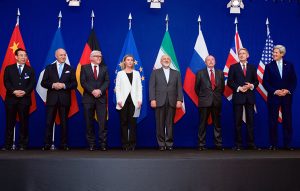By Rachel Emond, Scoville Fellow
 To anyone who asks, “How did you end up working at the Center for Arms Control and Non-Proliferation?” I’ve found myself responding, “Good question.” My path to landing at the Center is almost entirely unrelated to nuclear policy and has more than one layer, but I’m very grateful that it has gotten me to where I am right now.
To anyone who asks, “How did you end up working at the Center for Arms Control and Non-Proliferation?” I’ve found myself responding, “Good question.” My path to landing at the Center is almost entirely unrelated to nuclear policy and has more than one layer, but I’m very grateful that it has gotten me to where I am right now.
I graduated from the University of Tennessee at Chattanooga in May 2018 with a degree in Political Science – International Relations & Comparative Studies. While at UTC, I found that I was passionate about peacebuilding strategies, both at the international and more local levels. I was fascinated by conversations that related to human rights and international relations, and I began seeking out opportunities to explore these interests. I traveled to Cambodia to work with a local non-governmental organization in Phnom Penh; interned at the refugee resettlement agency in Chattanooga; studied EU directives and Spanish national legislation on parental leave in Spain; and spent time in Limuru, Kenya, working with a country-wide nonprofit. As a senior, my honors thesis explored the gendered rhetoric surrounding the Iran Deal (formally known as the Joint Comprehensive Plan of Action with Iran or JCPOA), and drew conclusions about the impacts this rhetoric has on women in foreign policy.
I was completely unsure of what I wanted to do when I graduated from UTC. I took a position with my local government in workforce development and really enjoyed the projects and learning about the bureaucracy of local policy. I knew, though, that I wanted to get back into work with a more international focus.
Being chosen for the Herbert Scoville Jr. Peace Fellowship has been an amazing opportunity. This fellowship brings young professionals to Washington, D.C., to work at a number of organizations throughout the city on issues related to international peace and security. I was drawn to this fellowship because of the emphasis it places on the intersection between advocacy and research, which are things that I truly enjoy and believe are critically important.
Ultimately, I ended up at the Center because of their clear commitment to tackling nuclear policy as a women’s issue. It’s somewhat coincidental that my thesis was based on a nuclear policy at all; the JCPOA was chosen because at the time it happened to be an extremely hot-button issue within the field and within public discourse. While studying the discourse of the JCPOA in particular, though, I’d become acutely aware of the fact that a majority of the policymakers and experts who had been quoted by journalists were men, as were most of the journalists. I wondered whether or not this impacted the type of rhetoric they were using, and I also wondered why it was a phenomenon in the first place. Were there not enough women in the field? Or were they just not being sought out?
After a discussion with (Senior Policy Director) Alex Bell on the opportunity I would have at the Center to look into why nuclear policy still isn’t seen as a women’s issue, I was hooked. I am beyond excited to continue working on and addressing this question as a Scoville Fellow at the Center, and am quite curious to see where it takes me afterwards. It’s clear that the possibilities are practically endless, but I feel that this is the beginning to an amazing, fulfilling career, no matter what my next step is.
